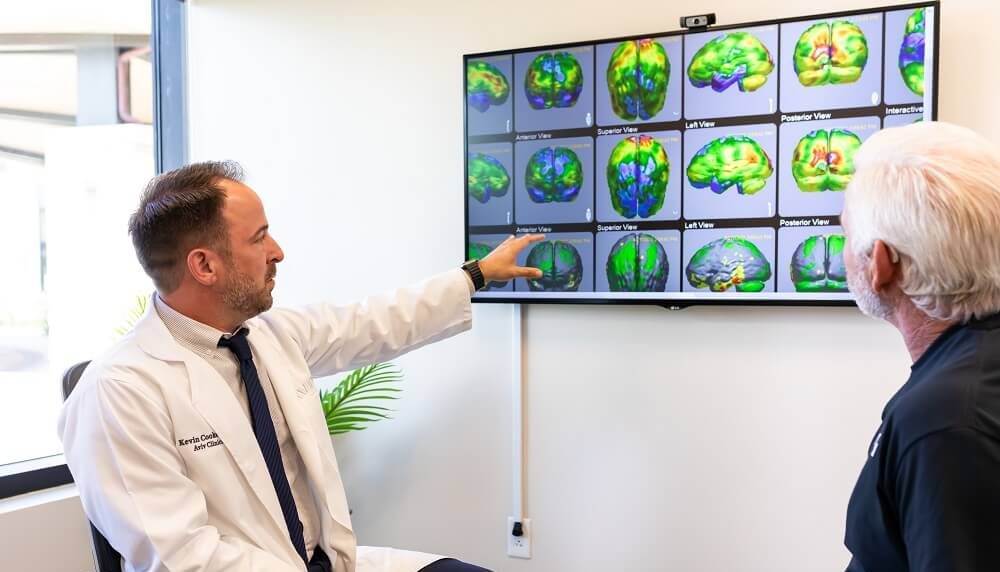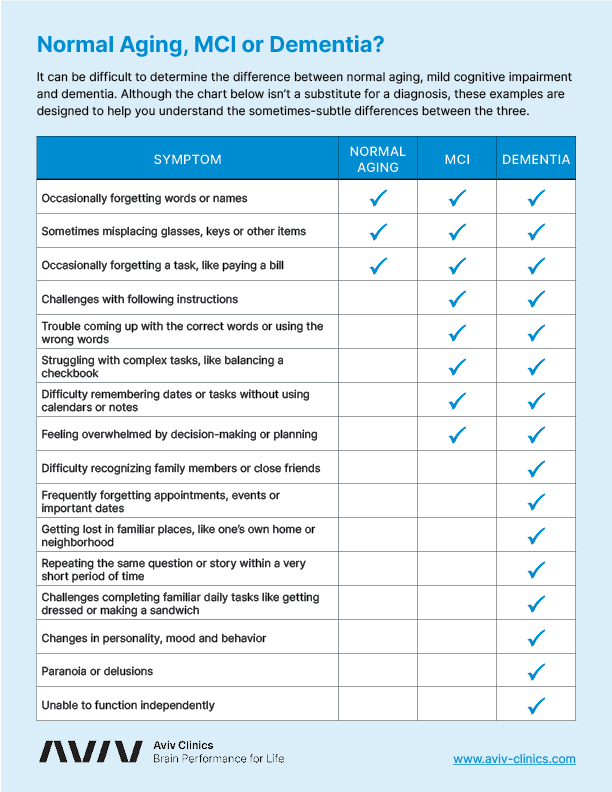
Could You Have Undiagnosed Mild Cognitive Impairment?


“More Than Seven Million Americans Have Undiagnosed Mild Cognitive Impairment.”
This was the alarming headline from the University of Southern California that unveiled the results of two recent studies on mild cognitive impairment (MCI). The first study, which was published in July 2023 in Alzheimer’s Research and Therapy, revealed that “7.4 of 8 million (92%)” of Americans with MCI, a common precursor to dementia and Alzheimer’s disease, may be unaware that they have the condition.
Even more concerning, the second study, published three months later in The Journal of Prevention of Alzheimer’s Disease, estimated that 99% of physicians are underdiagnosing MCI—“Only 0.1% of clinicians and practices had diagnosis rates within the expected range.”
But what is mild cognitive impairment, and what is the result of typical aging? Join us as we explore the symptoms, causes, and what you can do.
How Fast Does Mild Cognitive Impairment Progress?

While MCI doesn’t automatically lead to dementia, early detection is still crucial. According to the Alzheimer’s Association, within five years of diagnosis, as many as one in three MCI patients will develop dementia. Identifying MCI early allows for exploring potential treatment options and making important legal and financial arrangements for their future care.
At Aviv Clinics, we see people every day who are experiencing mild cognitive impairment. While some are diagnosed beforehand, many come to our clinic because they suspect something is amiss. If you find yourself in either of these groups, I’d like to take this opportunity to delve deeper into mild cognitive impairment treatment.
Mild Cognitive Impairment Symptoms and Diagnosis

Determining if a patient has MCI can be challenging for several reasons. Biological aging causes changes to our brain tissue and cognitive function, so patients may dismiss mild confusion or memory loss as just a consequence of growing older rather than exploring the potential diagnosis of MCI.
Second, mild cognitive impairment symptoms are inconsistent. It may be challenging to determine when symptoms indicate mild cognitive impairment vs. dementia, Alzheimer’s disease, or various other cognitive and mental health conditions. In addition to memory loss, MCI can manifest with the following symptoms:
- Difficulty making decisions
- Attention issues
- Language problems
People with MCI might also have symptoms of depression, irritability, anxiety, or apathy. To learn more about some of the indications of mild cognitive impairment, read our blog, “Signs and Symptoms of Cognitive Decline.”
Third, physicians don’t always closely assess brain health, especially if a patient has arrived for another reason. Researchers found that:
- A typical doctor’s visit lasts only about 17 minutes on average.
- During these appointments, numerous health concerns may be discussed. Of these, “topics each received 1.1 minutes” of total discussion.
For older adults, cognitive health may take a backseat to diabetes, high blood pressure, or other age-related concerns during a visit to the doctor.
Finally, the stigma surrounding cognitive impairment may cause people to hide symptoms. Nobody wants their loved ones to think they’re losing their mental acuity, and many older adults fear losing their independence. Consequently, they may withdraw from social interactions or make excuses for cognitive gaffes.
Measuring Cognitive Changes
How fast does mild cognitive impairment progress and become a diagnosable medical condition? Cognitive decline can manifest slowly. It may begin as occasional forgetfulness or trouble staying focused and start to interfere with one’s day-to-day functioning subtly over time, although it may be dismissed as part of the normal aging process.
For others, the decline can happen more rapidly. It is normal for cognitive processes to slow down when a person is in their 60s and 70s, but there is no standardized rate. The rate of decline varies greatly from person to person.
However, when you start to notice changes, particularly faster or more pronounced than expected, these shifts might signify something more than just age.
Find out more about cognitive performance and aging in our ebook: What’s Happening to My Brain? Understanding and Treating Mild Cognitive Impairment.
Normal Aging vs. Mild Cognitive Impairment vs. Dementia
Not all cognitive changes point to a diagnosis. Paying attention to these changes can help differentiate what is mild cognitive impairment, what is just the normal aging process, and what may indicate dementia.
Normal Aging
- Occasional memory lapses may occur, and memory loss complaints are infrequent.
- Difficulty finding words may happen, but isn’t a significant source of concern.
- Short-term memory about recent events and conversations is intact.
- The person remains independent, doesn’t get lost in familiar places, and remembers how to perform daily tasks.
Mild Cognitive Impairment
- Memory lapses become a concern for the person or their family members.
- Difficulty finding words occurs frequently and on a somewhat noticeable basis.
- Memory for recent events and conversations becomes impaired.
- The person remains independent but may occasionally have trouble finding their way in familiar places and resist learning new tasks.
Dementia
- Memory lapses are frequent and cause anxiety in the person and close family members.
- Difficulty finding words is noticeable in many conversations.
- Short-term memory, or the ability to maintain conversations, is noticeably impaired.
- The person depends on others for activities of daily living, may get lost in familiar places, and lose the ability to perform tasks that were once routine.
Testing for Mild Cognitive Impairment
If your physician suspects mild cognitive impairment, they’ll likely refer you to a specialist for further examination. However, there’s no single test for MCI. Instead, diagnosis will typically include a combination of assessments.
- Neuropsychological and cognitive function tests are vital as they evaluate cognitive skills like memory, attention, judgment, and planning. These examinations measure the degree of impairment.
- Psychological assessments can also provide a clearer picture of emotional factors that may be impacting cognitive function.
- Specialists will also try to rule out other causes of cognitive dysfunction by reviewing medical and family history, symptoms, and medications.
- Lab tests may reveal vitamin deficiencies, urinary tract infections, thyroid disorders, and other ailments that can mimic MCI symptoms.
- Neurological examinations can detect conditions that impair cognitive function, such as a tumor or stroke.
- Radiological imaging can capture the structure and function of the brain. Diagnostic imaging can reveal brain atrophy or other potential causes of cognitive dysfunction, while functional imaging offers insight into blood flow and metabolic changes in brain tissue. While radiological imaging is often associated with stroke diagnosis, it can be effective in evaluating a number of conditions, including cognitive impairment.
The Aviv Assessment

At Aviv Clinics, we can use all these tools as part of a comprehensive assessment of both brain and body function. This not only gives our clinical team a full picture of each client’s physical and cognitive health, but it also provides the insight we need to create customized treatment plans.
Depending on your condition, symptoms, and treatment goals, the Aviv Assessment can include:
- Comprehensive, scientifically validated cognitive tests, including the Montreal Cognitive Assessment, Cambridge Neuropsychological Test Automated Battery, and NeuroTrax
- Neuropsychological evaluation
- Extensive blood tests
- High resolution brain MRI and/or SPECT scans to measure brain activity and structure
- Tests of heart and lung function, including cardiopulmonary exercise testing (CPET), spirometry, and electrocardiogram (ECG)
- Analysis of gait, stance, range of motion, strength, and balance
- Body composition evaluation and dietary assessment
Mild Cognitive Impairment Treatment at Aviv Clinics

A Columbia University study estimates the prevalence of mild cognitive impairment at “22.2% among those 71 years and older.” However, MCI isn’t necessarily permanent—it can sometimes be improved or even reversed.
The Aviv Medical Program is a safe, non-drug intervention that can slow down cognitive decline, particularly in its early stages. Cognitive benefits of the Aviv Medical Program can include:
- Better brain function and connectivity
- Stronger executive function (decision-making, self-control, cognitive flexibility)
- Improved mental abilities, including memory, attention, and focus
- Increased information processing speed
- Improvements in mood and psychological factors, such as depression or anxiety
Real Stories, Real Progress with the Aviv Medical Program
After watching their parents suffer from dementia, Aviv clients Carl and Vickie feared that they were beginning to show some of the same alarming signs they’d observed in their parents. Worried about what could be mild cognitive impairment vs. dementia symptoms, they decided to take control of their aging process through the Aviv Medical Program. Watch their Aviv Clinics recovery story:
Bob and Laurie were also initially drawn to Aviv Clinics after watching Laurie’s father struggle with dementia and Alzheimer’s. From significant cognitive improvements to enhanced vitality, the program empowered them to lead an active and more memorable life with newfound resilience. Here’s their story:
People like Carl, Vickie, Bob, and Laurie are embracing their futures every day at Aviv Clinics. The results speak for themselves.
- 96% of Aviv clients experience clinically verifiable improvements in brain function
- 95% said they would recommend the Aviv Medical Program to their friends and loved ones






